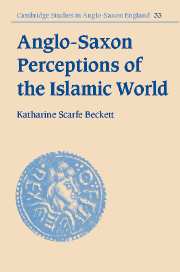Book contents
- Frontmatter
- Contents
- Acknowledgements
- List of abbreviations
- 1 Introduction
- 2 Islam during the Anglo-Saxon period
- 3 Anglo-Saxon contacts with Islam
- 4 Arabs and Arabia in Latin
- 5 Ismaelites and Saracens in Latin
- 6 Arabs, Ismaelites and Saracens in early Anglo-Latin
- 7 Pseudo-Methodius and the sons of Ismael
- 8 Arabs, Ismaelites and Saracens in Old English
- 9 Persisting theories about Saracens in post-Conquest England
- 10 Conclusions
- Bibliography
- Index
8 - Arabs, Ismaelites and Saracens in Old English
Published online by Cambridge University Press: 22 September 2009
- Frontmatter
- Contents
- Acknowledgements
- List of abbreviations
- 1 Introduction
- 2 Islam during the Anglo-Saxon period
- 3 Anglo-Saxon contacts with Islam
- 4 Arabs and Arabia in Latin
- 5 Ismaelites and Saracens in Latin
- 6 Arabs, Ismaelites and Saracens in early Anglo-Latin
- 7 Pseudo-Methodius and the sons of Ismael
- 8 Arabs, Ismaelites and Saracens in Old English
- 9 Persisting theories about Saracens in post-Conquest England
- 10 Conclusions
- Bibliography
- Index
Summary
Bede, like pseudo-Methodius, concluded his history on an optimistic note as far as the Muslim conquests were concerned: the Saracens in Gaul received the punishment they deserved. A few years later Bede died, but Saracen attacks on Christian territories continued to excite Anglo-Saxon comment. Scholars and missionaries who had moved to the Continent referred to the Saracens in their letters. During Bede's lifetime, Boniface warned the Anglo-Saxon abbess Bugga that the perils of undertaking a pilgrimage to Rome included the present threat of the Saracens. In another letter of 745–6 to Æthelbald, king of Mercia, Boniface described the Muslim attacks in Europe as an example of a divine punishment upon Christian sins: ‘Sicut aliis gentibus Hispaniae et Prouinciae et Burgundionum populis contigit; quae sic a Deo recedentes fornicatae sunt, donec iudex omnipotens talium criminum ultrices poenas per ignorantiam legis Dei et per Sarracenos uenire et saeuire permisit’. Perhaps he had seen an early copy of the Reuelationes. Later in the eighth century, Alcuin, writing to a Master Colcu in Ireland, echoed Bede's dismay at the extent of the Saracen depredations: ‘heu pro dolor, quod idem maledicti Saraceni, qui et Aggareni, tota dominantur Affrica, et Asia maiore maxima ex parte’. The fact that Alcuin added the phrase qui et Aggareni in a letter on current affairs shows that the identification of the Saracens with Ismaelites or Hagarenes in Latin was not limited to patristic expositions on scripture. At the same time, the patristic influence remained alive and well.
- Type
- Chapter
- Information
- Anglo-Saxon Perceptions of the Islamic World , pp. 165 - 189Publisher: Cambridge University PressPrint publication year: 2003



